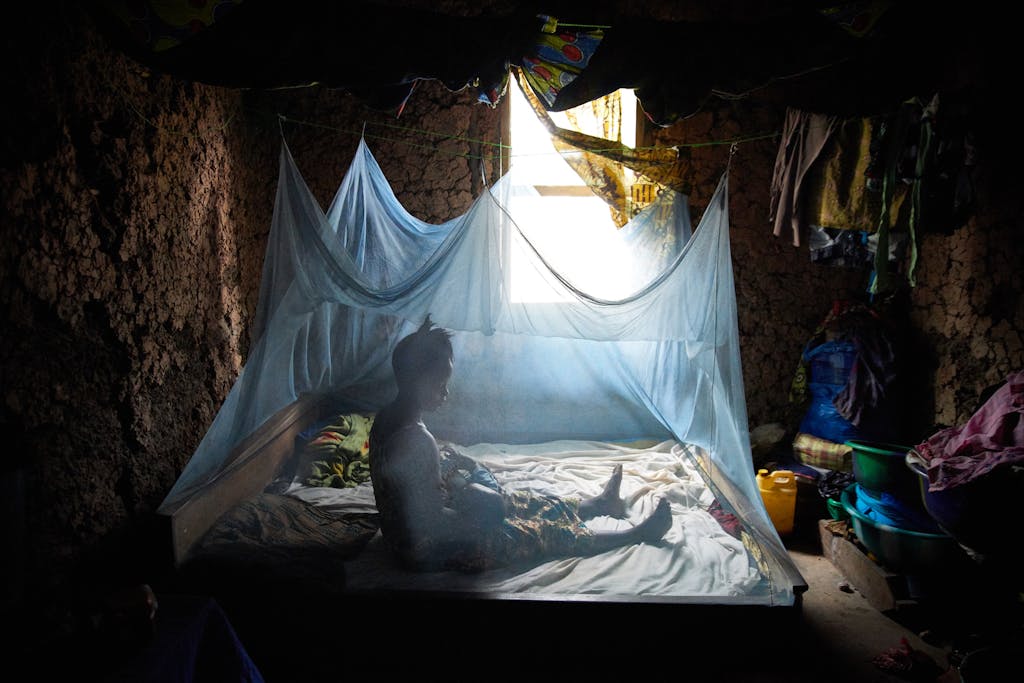Last updated October 4, 2023
Written by: Lori Sloate, Senior Director for Global Health, United Nations Foundation
On October 2, 2023, the World Health Organization (WHO) recommended R21/Matrix-M, the world’s second malaria vaccine. This announcement has provided a ray of hope, not just for the tens of thousands of kids whose lives could be saved each year by this vaccine, but also for all those living in areas of high malaria transmission, where health systems are often overwhelmed by malaria cases.
Previously, only the RTS,S vaccine had been recommended by WHO for protection against malaria, and it is still the only malaria vaccine to be prequalified by WHO. The exciting R21 news comes after 12 countries were promised 18 million doses of RTS,S vaccines over the next three years (2023-25) in July. However, demand for malaria vaccines far outstrips supply. Annual global demand for malaria vaccines is estimated at 40–60 million doses by 2026 alone, growing to 80–100 million doses each year by 2030. The Serum Institute of India is poised to produce 100 million doses per year of R21, with the possibility of doubling that over the next two years.
The timing of this recommendation is crucial for countries with high malaria transmission, like Malawi. In June, at the Global Vaccine Impact Conference in Madrid, Khumbize Kandodo Chiponda, Minister of Health from Malawi, shared that, in her country with a population of 19 million, 40% of all out-patient healthcare visits, or four out of 10, are due to malaria. Malawi is not alone: health systems in Tanzania, Kenya, and Ghana are all encumbered by significant malaria burden.
What if we could leapfrog to a future where malaria was eliminated, and health care systems were able to free up services for other essential health needs?

This new recommendation follows advice from the WHO Strategic Advisory Group of Experts on Immunization (SAGE) and the Malaria Policy Advisory Group (MPAG) and was endorsed by the WHO Director-General following its regular biannual meeting held on September 25-29, 2023. The experts’ advice was based on evidence from trials of the R21 vaccine, which showed that in areas with seasonal transmission, it reduced symptomatic cases of malaria by 75% in the 12 months following a three-dose series of the vaccine. A fourth dose given a year later maintained efficacy. This high efficacy is similar to the efficacy demonstrated when RTS,S is given seasonally.
To be clear, malaria vaccines are not silver bullets, and their efficacy relies upon other malaria interventions to maximize protection against the disease. The vaccine needs to be used with other tools, such as insecticide-treated nets, indoor residual spraying, and preventive medicines, to have the greatest impact.
It is within WHO’s global mandate to ensure that new vaccines are safe, effective, and suitable. This has two parts:
Therefore, in order for UNICEF to procure the R21 vaccines and for Gavi to provide funding support for vaccine deployment, two things had to happen: a WHO policy recommendation and WHO prequalification. With the first requirement now met, the next step is prequalification, which is set to be determined later this year.

To date, at least 28 countries in Africa plan to introduce a WHO-recommended malaria vaccine as part of their national immunization programs. Gavi has approved providing technical and financial support to roll out malaria vaccines to 18 countries. Based on the RTS,S pilot phase in three countries, and the agreement to roll out to 12 countries over the next three years, more African countries will receive the RTS,S vaccine in early 2024, and the R21 malaria vaccine is expected to become available to countries by mid-2024.
While the road ahead is long, the availability of two approved and certified malaria vaccines provides a viable path towards elimination. I was reminded of a similar fate of some of the physical rehabilitation centers in India that were set up in the wake of polio eradication in that country. With fewer cases of paralysis and the need for those services still present but waning, one such center was repurposed to become a vocational center. Just imagine what health care centers in African countries with high malaria transmission rates could do if their out-patient load was reduced by 40%.
Lori Sloate is the Senior Director for Global Health at the UN Foundation. Prior to her work at the Foundation, Lori was the Deputy Director of Advocacy and Public Policy at Gavi, the Vaccine Alliance for four years. She also worked with the World Health Organization for nearly 10 years, working with ministries and partners and advocating for global campaigns around various health issues. She has worked with other UN agencies, such as UNESCAP in Bangkok and UNOPS in Vietnam. Lori has a Master’s Degree in intercultural and international management from the School for International Training in the United States and has studied economics and development at the University of Nice, France.
To get the latest Global Health news from experts like Lori, subscribe to our monthly newsletter.